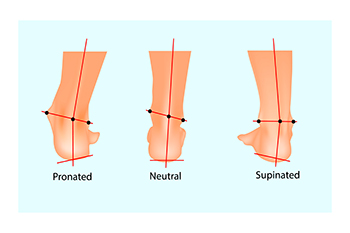
Foot pronation, particularly common in women due to factors like hip structure and footwear choices, can contribute to low back pain. Pronation occurs when the foot rolls inward excessively during walking or running, leading to an uneven distribution of weight. This misalignment creates a chain reaction that affects posture, causing the knees to rotate inward and the hips to tilt, placing strain on the lower back. Over time, this improper alignment can lead to muscle fatigue, joint stress, and chronic low back pain. Women are more susceptible due to wider hips and often wearing shoes with poor arch support. A podiatrist can help by evaluating gait and prescribing custom orthotics to correct foot alignment, offering support where it is needed most. Proper orthotics reduce pronation, relieve pressure on the lower back, and improve overall posture, helping to alleviate pain and prevent future issues. If you are experiencing low back pain, it is suggested that you make an appointment with a podiatrist to see if the biomechanics of your feet can be improved.
If you have any concerns about your feet, contact Brandon M. Zuklie, DPM from New Jersey. Our doctor can provide the care you need to keep you pain-free and on your feet.
Biomechanics in Podiatry
Podiatric biomechanics is a particular sector of specialty podiatry with licensed practitioners who are trained to diagnose and treat conditions affecting the foot, ankle and lower leg. Biomechanics deals with the forces that act against the body, causing an interference with the biological structures. It focuses on the movement of the ankle, the foot and the forces that interact with them.
A History of Biomechanics
- Biomechanics dates back to the BC era in Egypt where evidence of professional foot care has been recorded.
- In 1974, biomechanics gained a higher profile from the studies of Merton Root, who claimed that by changing or controlling the forces between the ankle and the foot, corrections or conditions could be implemented to gain strength and coordination in the area.
Modern technological improvements are based on past theories and therapeutic processes that provide a better understanding of podiatric concepts for biomechanics. Computers can provide accurate information about the forces and patterns of the feet and lower legs.
Understanding biomechanics of the feet can help improve and eliminate pain, stopping further stress to the foot.
If you have any questions please feel free to contact our offices located in Piscataway, Jamesburg, and Branchburg, NJ . We offer the newest diagnostic and treatment technologies for all your foot and ankle needs.
